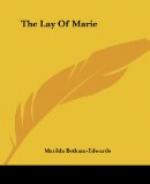Whether Mary was the author of any other pieces I have not been able to ascertain: her taste, and the extreme facility with which she wrote poetry of the lighter kind, induce a presumption that she was; but I know of none that have come down to us.
FOOTNOTES:
[4] Prologue des Lais de Marie.
[5] Lai du chevrefeuille.
[6] Pyramus, Vie de St Edmund, Bibl. Cotton. Domit. A. XI.
[7] Prolog. des Lais de Marie.
[8] It is reasonable to conclude, that writers flocked in greater numbers to the court where they were most in request, and were likely to be most liberally rewarded. Now it is evident that the Dukes of Normandy, when possessed of the crown of England, were incomparably more wealthy, though not in the same proportion more powerful, than the contemporary Kings of France; and it may be presumed that the crowd of candidates for their patronage, was consequently, much more numerous. Our Henry the Second possessed, in right of his father, Maine, Anjou, and Touraine; in right of his wife Eleanor, divorced by Louis le Jeune, the counties of Poictou and Guienne; in right of his mother Matilda, Normandy and England; and his power in the latter, the most valuable part of his dominions, was paramount and uncontrolled, while Louis was surrounded by powerful and rival vassals. We are, therefore, justified in suspecting that the courts of our Norman sovereigns, rather than those of the Kings of France, produced the birth of romance literature; and this suspicion is confirmed by the testimony of three French writers, whose authority is the more conclusive, because they have formed their opinion from separate and independent premises.
The first of these is M. de la Ravallere. In his Essay on the Revolutions of the French Language, a work of considerable learning, supported by original authorities, whose words he almost constantly quotes, he distinctly asserts that the pretended patronage of the French princes, anterior to Philippe Auguste, had no visible effect on their domestic literature; that while so many poets were entertained at the courts of the Anglo-Norman princes, no one can be traced to that of Louis le Jeune; that the chronicles of Britain and Normandy, the subjects chosen by Wace and his contemporaries, were not likely to interest the French, &c.
The second authority is M. le Comte de Tressan, a writer, perhaps, of no deep research, but whose good taste is conclusive on points of internal evidence. In his preface to the prose romance of “La Fleur des Batailles,” (one of those relating to Charlemagne) he says—The style and character of these romances lead us to think that they were composed at the court of the English kings, descended from William the Conqueror. We find in those of the Round Table, a marked affectation of dwelling on every thing which can contribute to the glory of the throne and court of England, whose princes and knights always play the chief and most brilliant part in the piece.




